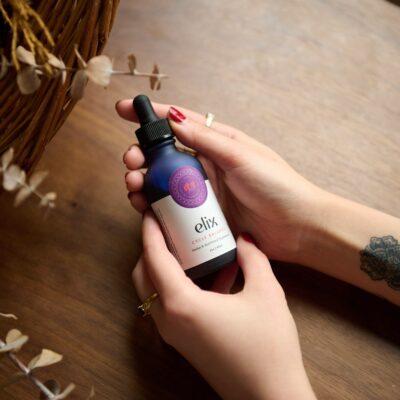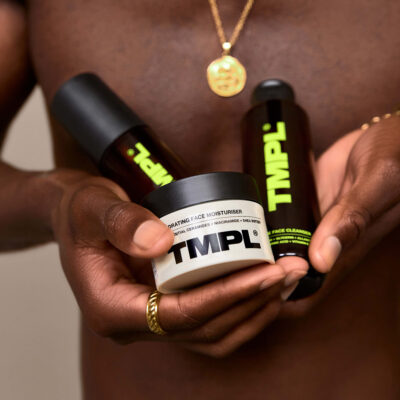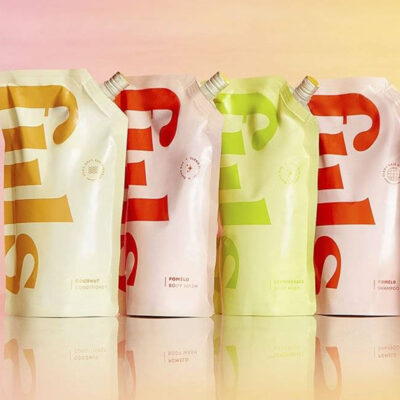
Plastic Surgeons Offer Their Takes On TikTok’s Viral “Aged” Filter
We may not know when or how we’ll die, but, thanks to TikTok, we’ll know what we could look like in our old age.
The social media network that brought us the “Bold Glamour” filter, which made people appear so perfect it was slammed for promoting unreachable beauty standards, and the “Teenage” filter that sent users into puddles reflecting on simpler, more innocent times has riffled in its artificial intelligence toolbox yet again to produce the “Aged” filter, an instant time machine that puts decades on faces without the associated wisdom.
The astonishing ability to glimpse into the future has led 9.7 million TikTok videos to incorporate the Aged filter. It’s certainly entertaining, but is it dangerous? We checked in with plastic surgeons Ramtin Kassir and Ira L. Savetsky to get their takes.
What’s your opinion on the old filter on TikTok? What’s right with it? What’s wrong with it?
Kassir: What’s going right [is the] entertainment value. Many users find it amusing and enjoy seeing themselves or others transformed into older versions, imagining what they might look like in the future. [There is also] creativity and self-expression. TikTok users have embraced the filter as an opportunity to showcase their creativity and storytelling skills. They often incorporate the filter into humorous or dramatic skits, adding an extra element of fun to their content.
What’s wrong is accuracy and misrepresentation. One of the criticisms of the filter is that it doesn’t always provide an accurate representation of how someone might age. The filter’s algorithm may not consider individual features, lifestyle factors or genetic variations that contribute to the aging process. As a result, the filtered results may not reflect a realistic depiction of an individual’s future appearance.
While the filter is generally intended for entertainment purposes, some argue that it may have unintended consequences. The filter could potentially lead to age-related insecurities or negative self-perception, especially for individuals who feel anxious about aging or have body image concerns. It’s important for users to remember that the filter is just a digital effect and not a reflection of their actual future appearance.
Savetsky: Using a filter that creates an older version of oneself can bring both advantages and disadvantages.
Advantages:
-
Enjoyment and entertainment: It can be fun to see a simulated future version of oneself.
-
Self-reflection: Viewing an older version of oneself can encourage introspection.
-
Informational value: The filter offers a visual representation of the aging process, reminding individuals to prioritize their health and well-being.
Disadvantages:
-
Unrealistic portrayal: The filter’s predictions may not be entirely accurate due to reliance on algorithms and assumptions. Actual aging can be influenced by various factors and significantly differ from the filter’s projections.
-
Emotional impact: Some individuals may find the image of their older self distressing or unsettling, especially if they have concerns about aging or body image.
-
Psychological effects: Regular exposure to an older version of oneself may increase preoccupation with aging, potentially impacting self-esteem and mental well-being.
Can the Aged filter on TikTok create unrealistic expectations among users who may seek plastic surgery down the line?
Kassir: Yes, the use of filters on TikTok, especially those that alter one’s appearance by enhancing features or creating a flawless look, can contribute to unrealistic expectations among users. When individuals repeatedly see themselves or others with perfect appearances through filters, it can create a distorted perception of beauty and an unrealistic standard for how they should look in real life.
This distortion can potentially lead some users to consider undergoing plastic surgery to achieve the filtered appearance they desire. They may develop a belief that plastic surgery is the only way to attain the flawless look they see on TikTok, even though filters are not representative of real-life appearances. This can be concerning as it may lead to unnecessary surgical procedures, dissatisfaction with natural features and potential psychological distress.
It’s essential for users to remember that filters are simply digital enhancements and do not reflect reality. Social media platforms like TikTok can heavily influence users’ self-perception and body image, so it’s important to maintain a critical perspective and recognize that real beauty comes in diverse forms. Promoting self-acceptance, body positivity and an understanding of digital manipulation can help mitigate the potential negative impact of filters on users’ mental well-being and their perceptions of beauty.
Savetsky: A filter that creates an unrealistic older version of oneself has the potential to contribute to unrealistic expectations among users. When individuals perceive a filtered image that enhances their attractiveness or desirability, it can distort their perception of beauty and aging.
If some individuals become fixated on achieving the filtered appearance through plastic surgery, they may develop unrealistic expectations for the outcomes of such procedures. Consequently, they may experience disappointment and dissatisfaction when the actual results fail to align with the filtered image. It is important to acknowledge that filters often present exaggerated or idealized versions of reality and should not serve as a basis for making decisions regarding altering one’s physical appearance.
When contemplating plastic surgery or any cosmetic procedure, it is crucial for individuals to seek guidance from qualified professionals who can offer realistic assessments and personalized advice based on their unique needs and circumstances. Engaging in open and honest conversations with medical experts is advisable to ensure informed decision-making and the effective management of expectations.
What are your thoughts on using the Aged filter on TikTok to promote or showcase cosmetic procedures? How does it impact people’s perception of these procedures?
Kassir: Using the Aged filter on TikTok to promote or showcase cosmetic procedures can have both positive and negative effects on people’s perception of these procedures.
On the positive side, showcasing cosmetic procedures through the Aged filter on TikTok can help to destigmatize these procedures by making them appear more relatable and accessible. It allows individuals to demonstrate their personal experiences and share their journey with others, potentially fostering a sense of community and support.
Additionally, using the Aged filter may provide a visual representation of the potential results of cosmetic procedures, which can be helpful for those considering such procedures. It allows people to see the potential transformations and decide if they align with their own aesthetic goals.
However, there are also potential negative implications. By utilizing the Aged filter, the portrayal of cosmetic procedures may become distorted or exaggerated. This could create unrealistic expectations among viewers as the filter alters one’s appearance significantly and may not accurately represent the actual outcomes of the procedures. Consequently, it may mislead people about the realistic results and potential risks associated with cosmetic procedures.
Moreover, the focus on filters and aesthetics could place an undue emphasis on external appearance and reinforce societal beauty standards. This may lead to increased pressure on individuals to conform to these standards, potentially impacting their self-esteem and body image.
As a plastic surgeon, what ethical concerns do you have regarding the promotion of cosmetic procedures on TikTok, particularly when it comes to potentially vulnerable or impressionable users?
Savetsky: Plastic surgeons often have ethical concerns related to the promotion of cosmetic procedures on social media, particularly when it involves potentially vulnerable or impressionable users. These concerns include:
-
Informed consent: Plastic surgeons have an ethical responsibility to provide individuals considering cosmetic procedures with accurate and comprehensive information, including potential risks, benefits and alternatives. However, on social media, the information shared may be limited, sensationalized or biased, which can compromise individuals’ ability to make fully informed decisions.
-
Unrealistic expectations: Social media platforms frequently display filtered or edited images that present an unrealistic standard of beauty or idealized cosmetic procedure results. This can create false expectations among users, leading to dissatisfaction, disappointment and potential psychological harm when the actual outcomes do not match the highly edited representations.
-
Vulnerable users: Social media is accessible to users of various ages, including vulnerable or impressionable individuals such as teenagers or those with low self-esteem. Plastic surgeons have a responsibility to consider the potential impact of their content on these users, avoiding exploitation of vulnerabilities and refraining from perpetuating unrealistic beauty standards that may negatively affect well-being.
-
Promotion of unnecessary procedures: Plastic surgeons should prioritize the well-being and best interests of their patients. However, on social media, there is a risk of promoting unnecessary procedures driven solely by commercial purposes or financial gain.
-
Professionalism and integrity: Board-certified plastic surgeons are ethically obligated to maintain professionalism, integrity and transparency in their communications, including on social media platforms. It is crucial to provide accurate, evidence-based information, avoid deceptive practices, disclose any conflicts of interest, and respect patient confidentiality and privacy.
What steps can be taken to promote a healthier perception of beauty among TikTok users in the presence of filters?
Savetsky: TikTok can implement educational initiatives to raise awareness about the use of filters and their potential effects on self-perception. Discussions on body image, self-esteem and the influence of filters can help users understand the limitations and potential distortions created by these enhancements.
TikTok can introduce a feature that notifies users when a video is using a filter. This disclosure reminds users that the appearance they see may not accurately represent reality, fostering a more critical understanding of filtered content and its impact. Promot[ing] and highlight[ing] diverse beauty standards and body positivity content can help. Showcasing creators with different body types, skin tones and appearances challenges traditional ideals and promotes inclusivity, allowing users to appreciate beauty in all its forms.
Finally, collaborating with mental health professionals and organizations specializing in body image and self-esteem can provide expert insights and resources. This can result in the creation of educational materials, campaigns or in-app resources that promote positive body image and mental well-being.
What recommendations would you provide to people who may feel influenced by the Aged filter on TikTok in terms of their self-image and self-acceptance?
Savetsky: It’s important to understand that aging face filters on TikTok are digital simulations and do not accurately reflect the actual aging process. Filters often present exaggerated or idealized representations that may not align with real-life aging experiences.
We should encourage individuals to celebrate their unique features and characteristics, as everyone ages differently. And remind them that true beauty lies in embracing their individuality rather than striving for an unattainable or filtered appearance.
Additionally, [they should] shift the focus from external appearance to overall well-being. Promoting the importance of prioritizing physical and mental health, significantly contributes to one’s overall attractiveness and self-confidence. Encourage healthy lifestyle habits and self-care practices.
[It’s also important to] foster open and honest communication between [people] and their plastic surgeon. This allows for a comprehensive understanding of their concerns, goals and motivations. Plastic surgeons can provide personalized advice and recommendations based on an individual’s unique circumstances.
Finally, encouraging individuals to cultivate self-acceptance and body positivity [matters]. Helping them develop a positive self-image by focusing on their strengths, achievements and inner qualities will contribute to their overall attractiveness and well-being.




